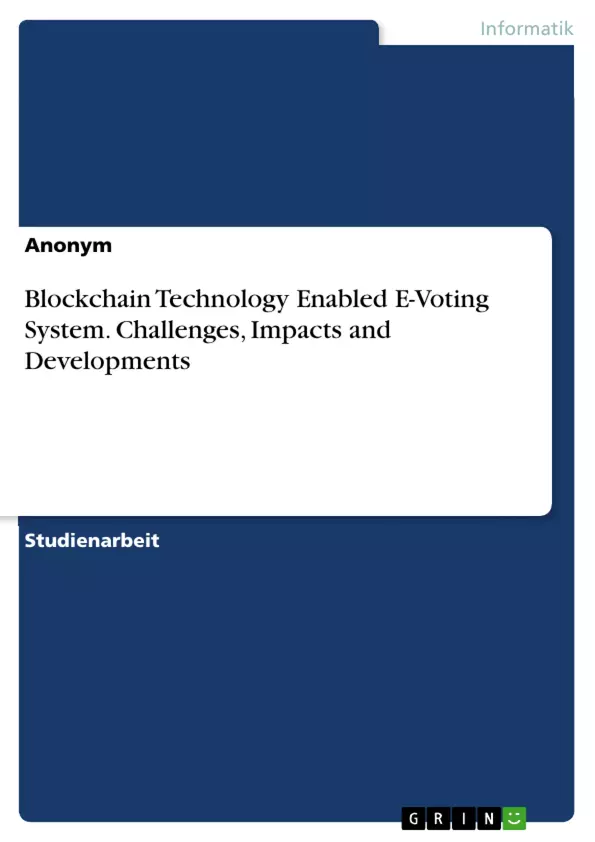In this paper the author talks about electronic voting systems, requirements, strengths, and challenges associated with them. The paper explores more on Blockchain technology including benefits, impacts, risks in implementing the Blockchain based electronic voting system, and touch upon the current e-voting projects. Finally, the author describes the proposed model for E-Voting system and concludes this report.
Voting is an essential tool for any democratic government, it’s the most important factor which makes government for the people and by the people, until now the paper ballot has been used for voting in most countries of the world where voters mark their vote on the paper and put it in the ballot box and at the end of election the votes are counted, but the biggest disadvantage of this system is that it cannot be auto-mated and voters have to physically go to the location for voting that makes the entire process very time consuming and expensive, also digital ballots are vulnerable to hackers and results can be compromised, with the Blockchain technology and cryptography any user can login in GUI using the credentials provided by national election authority and cast their vote by signing it with their private key and trusted miners could verify whether the votes are legit or not by using voter’s public keys that makes the entire e-voting process transparent, cost effective, safe and secure.
The proposed system consists of a GUI, an application interface, central database, Blockchain network. Pre-election registration process, voting, counting, final election results and auditing were explained. The consensus algorithm was proof-of-work, all the election properties such as validity, privacy, individuality, flexibility etc. were satisfied.
Inhaltsverzeichnis
- Abstract
- List of Figures
- List of Tables
- 1 Introduction
- 2 E-Voting Systems:
- 2.1 E-Voting advantages:
- 2.2 E-Voting disadvantages:
- 3 Blockchain technology overview:
- 3.1 Network Consensus:
- 3.2 Smart Contracts:
- 4 Blockchain enabled E-Voting:
- 5 Opportunities and benefits:
- 6 Challenges, Impacts and Developments:
- 6.1 Challenges in Blockchain Voting:
- 6.2 Impact and Developments:
- 7 Current E-Voting Projects in the Market:
- 8 Proposed E-Voting System:
- 8.1 Election Process:
- 8.2 Election Network:
- 9 Conclusion:
Zielsetzung und Themenschwerpunkte
Diese Seminararbeit befasst sich mit der Implementierung eines Blockchain-basierten E-Voting-Systems. Die Arbeit analysiert die Herausforderungen, Chancen und Entwicklungen im Bereich des E-Votings im Kontext der Blockchain-Technologie. Darüber hinaus wird ein konkretes E-Voting-System vorgeschlagen und seine Funktionsweise detailliert erläutert.
- Vorteile und Nachteile von E-Voting-Systemen
- Grundlagen und Funktionsweise der Blockchain-Technologie
- Einsatzmöglichkeiten der Blockchain-Technologie im Bereich des E-Votings
- Herausforderungen und Entwicklungen bei der Implementierung von Blockchain-basierten E-Voting-Systemen
- Design und Funktionsweise eines vorgeschlagenen E-Voting-Systems
Zusammenfassung der Kapitel
- Kapitel 1: Introduction: Dieses Kapitel liefert eine Einführung in die Thematik des E-Votings und die Bedeutung der Blockchain-Technologie in diesem Kontext. Es werden die Herausforderungen und Chancen von traditionellen E-Voting-Systemen aufgezeigt und die Vorteile der Blockchain-basierten E-Voting-Systeme hervorgehoben.
- Kapitel 2: E-Voting Systems: Dieses Kapitel bietet einen Überblick über die Vor- und Nachteile von E-Voting-Systemen. Es analysiert die Sicherheitsrisiken und die Herausforderungen der traditionellen E-Voting-Systeme.
- Kapitel 3: Blockchain Technology Overview: Dieses Kapitel vermittelt grundlegendes Wissen über die Blockchain-Technologie, einschließlich des Netzwerk-Konsenses und der Funktionsweise von Smart Contracts.
- Kapitel 4: Blockchain Enabled E-Voting: Dieses Kapitel beleuchtet die Anwendung der Blockchain-Technologie im Bereich des E-Votings. Es analysiert die Möglichkeiten, die Blockchain bietet, um ein sicheres, transparentes und effizientes E-Voting-System zu ermöglichen.
- Kapitel 5: Opportunities and benefits: Dieses Kapitel beleuchtet die Vorteile und Möglichkeiten der Blockchain-basierten E-Voting-Systeme. Es zeigt auf, wie diese Systeme zu einer höheren Wahlbeteiligung, mehr Transparenz und weniger Wahlbetrug beitragen können.
- Kapitel 6: Challenges, Impacts and Developments: Dieses Kapitel beleuchtet die Herausforderungen, die sich bei der Implementierung von Blockchain-basierten E-Voting-Systemen stellen. Es analysiert die Auswirkungen dieser Systeme auf die Wahlprozesse und beschreibt die aktuellen Entwicklungen im Bereich der Blockchain-basierten E-Voting-Systeme.
- Kapitel 7: Current E-Voting Projects in the Market: Dieses Kapitel stellt aktuelle E-Voting-Projekte vor, die die Blockchain-Technologie nutzen. Es analysiert die Funktionsweise dieser Projekte und ihre Stärken und Schwächen.
- Kapitel 8: Proposed E-Voting System: Dieses Kapitel beschreibt ein konkretes E-Voting-System, das auf der Blockchain-Technologie basiert. Es erläutert die einzelnen Phasen des Wahlprozesses, die Netzwerkarchitektur und die Funktionsweise des Systems.
Schlüsselwörter
Die wichtigsten Schlüsselwörter und Schwerpunktthemen dieser Arbeit sind: E-Voting, Blockchain-Technologie, Kryptografie, Smart Contracts, dezentrale Systeme, Wahlintegrität, Sicherheit, Datenschutz, Transparenz, Effizienz, Wahlbeteiligung, Wahlbetrug, Proof-of-Work, Konsensmechanismus, dezentrale Wahlverwaltung, E-Voting-Projekte, Blockchain-basierte E-Voting-Systeme.
Häufig gestellte Fragen
Wie kann Blockchain die Sicherheit von E-Voting-Systemen verbessern?
Durch Kryptografie und dezentrale Verifizierung (Trusted Miners) wird der Wahlvorgang transparent, manipulationssicher und nachvollziehbar gestaltet.
Was sind die größten Nachteile traditioneller Papierwahlen?
Sie sind zeitaufwendig, teuer, können nicht automatisiert werden und erfordern die physische Anwesenheit der Wähler am Wahlort.
Welcher Konsensalgorithmus wird in dem vorgeschlagenen Modell verwendet?
Das vorgeschlagene Modell nutzt den Proof-of-Work-Algorithmus zur Sicherung des Netzwerks.
Wie authentifizieren sich Wähler im Blockchain-System?
Wähler loggen sich mit von der Wahlbehörde bereitgestellten Zugangsdaten ein und geben ihre Stimme durch Signieren mit ihrem privaten Schlüssel ab.
Welche Phasen umfasst der E-Voting-Prozess im vorgeschlagenen System?
Der Prozess umfasst die Registrierung vor der Wahl, die Stimmabgabe, die Auszählung, die Veröffentlichung der Endergebnisse und die abschließende Prüfung (Auditing).
- Arbeit zitieren
- Anonym (Autor:in), 2020, Blockchain Technology Enabled E-Voting System. Challenges, Impacts and Developments, München, GRIN Verlag, https://www.grin.com/document/901056



